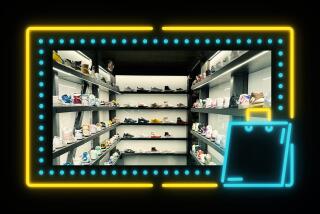Something’s in Store for the Dearly Departed
- Share via
WENATCHEE, Wash. — Buying a casket is grave business, but a pair of north-central Washington entrepreneurs are trying to make it a little less solemn and a lot less expensive.
In December, Pat Kichler and George Otto opened The Casket Store, a brightly lighted, no-frills retail store for, quite obviously, caskets.
A dozen models are on display, ranging from a basic $725 denim-covered fiberboard casket to a $2,650 design called the Pieta Poplar with scenes of the Last Supper depicted on the hardware.
The idea is to give consumers a chance to shop around and make some dispassionate choices before they are in the throes of grief or perhaps become the dearly departed themselves.
“You have a choice on everything you purchase. Why not have that with a casket?” asks Otto.
Casket retailers got a helping hand in 1994 from a Federal Trade Commission ruling that requires funeral homes to accept caskets from outside sources without charging a handling fee or otherwise imposing a penalty.
Today, caskets and urns can be purchased online and from a number of retail storefronts. Alex Carey, owner of the Toronto-based Casket Store chain, expects to do about $5 million in business this year and open 50 new stores.
Five years after opening the first one in Canada, there are now 28 franchises and dealerships--including the Wenatchee store--in North America. The chain is coast-to-coast in Canada and has stores in several U.S. cities, including Philadelphia; Cleveland; Cincinnati; Fort Lauderdale, Fla.; Winston-Salem, N.C.; and Knoxville, Tenn.
“We try to align ourselves with funeral homes,” Carey says. “We want nothing antagonistic.”
Although a retail store is competition for a funeral home at one level, it can also be a good business ally because it’s in position to make recommendations to families looking for those services, Carey says.
Toby Haberlock, manager at Jones & Jones Funeral Directors in Wenatchee, says his establishment is prepared to deal with the changes that such enterprises are bringing to the industry.
“We’re going to have to be a little more competitive,” Haberlock says. “If that means reducing prices, we may indeed do that.”
The Vancouver, British Columbia-based Loewen Group bought Jones & Jones about 2 1/2 years ago. With several hundred mortuaries in North America, it is able to team up with some of the larger casket manufacturers for better wholesale prices, Haberlock says.
Caskets sold at Jones & Jones run from about $750 to $6,500, with even more expensive models available upon request, he says.
As for caskets purchased elsewhere: “We have absolutely no problem with them having it delivered or bringing it themselves. The same goes for urns.”
In January, the Justice Department approved a plan to let family-owned funeral homes band together to buy caskets at a bulk discount.
Family-owned funeral homes face stiff price-cutting from direct retail sellers of caskets and from corporate funeral-home chains that obtain quantity discounts from casket makers. So they sought permission from the department’s antitrust division to make joint purchases to get similar discounts.
Kichler says he expects to do business across the state once word gets out about the Casket Store.
“We’re centrally located. We feel we can service the state of Washington,” he says.
The Casket Store is located in a squat storefront in the business district, adjacent to Kichler and Otto’s paint store. There’s a car dealership across the street and a beauty salon next door.
Carey and Kichler believe the public is ready for this, but some folks in Wenatchee are still getting used to the idea of shopping around for a casket as you would a dishwasher or a new VCR.
“I’m all for free enterprise, but I think it’s kind of weird,” says Brenda Pelton, 40, manager of the downtown Cherie clothing shop.
“To me it’s sort of like the drugstore selling food. I get aggravated when I see the tuna there. Let the grocery store sell it.”
But James E. Heppell, 56, a grant-writing consultant interviewed as he ran some errands, said he’s not uncomfortable with the idea of retail coffin sales, though death is always difficult.
“I would just say it’s private enterprise doing what’s best,” he says. “It’s nice to have . . . competition there.”
Kichler, 32, and Otto, 27, believe that time is on their side--and that baby boomers will be too, once they get accustomed to the notion.
“It’s an entirely new concept,” Kichler says.
“Baby boomers are intelligent consumers. We’re looking at a crowd a little more open to it.”
More to Read
Inside the business of entertainment
The Wide Shot brings you news, analysis and insights on everything from streaming wars to production — and what it all means for the future.
You may occasionally receive promotional content from the Los Angeles Times.










